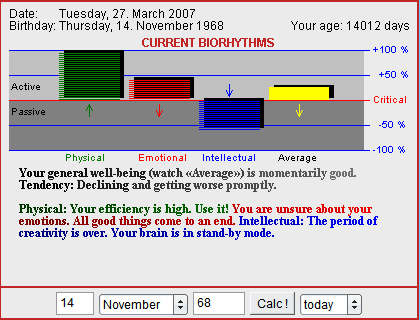Time to put the manic energy I have this morning to use.
One of the most interesting things about Bipolar is that genetics plays a substantial role in determining whether you will have it. In my case, my family is a disaster when it comes to mental health.
On my father’s side, there is a long and glorious history of schizophrenia and bipolar, including at least 2 grand-uncles, and their children. Two of my father’s cousins have committed suicide.
My grandfather committed suicide in 1978.
Everyone says that this was out of the blue, there was no reason for it. He left no note, or showed any indication. But as I learn more about this condition, this state of mind, I realize that the suicidal depressions can often swamp you, flood you, to a point where a person who appears fine will take the final action in the next minute.
On my mother’s side, my grandfather medicated with rye. As well, he had amazingly manic states; at least, that’s what we would call them now. He passed the genes along to two of his children, one of whom is my mother.
Over the last 10 years, my mother has degraded to a point where she lives alone, rarely goes out, is socially inappropriate, and has tried suicide at least once.
When I speak with her, it is hard to stare into the face of what I might become, what I must be aware of, what the costs of this condition can be.
So, I was doomed from the start. My father, a man who was challenged by his own demons, married a woman who is a wildly cycling bipolar II.
My family is lucky. As far as I can tell, I absorbed all of the bipolar genetics, leaving my brothers to conquer the world in their own ways, without the chaos that tears my mind apart. I am sure that they look at me and wonder why I am so nuts. I am sure that I am not alone in being the odd family member in a sea of normals.
So when you are in the depths of your misery, or at the heights of your mania, try to step back. Ask your parents, siblings, grandparents, cousins, uncles. Try and find the thread, the trail that leads through your family. Somewhere along that trail, likely in many places, the “characters” or “eccentrics” or “troubled souls” will leap out at you. These are the people who suffered, and revelled, in their condition, and passed it to you.
And realize that you can’t lay blame. You can’t transfer your woe and misery and mania to someone who is likely long gone. You just need to understand that you are the current carrier of a torch that originated long before you were born.
 So, last week, I did it. I dropped Paxil/paroxetine/seroxat completely from my medicines. Seems that other medical issues I am having are aggravated by the stuff, so after 7.5 years, it’s gone.
So, last week, I did it. I dropped Paxil/paroxetine/seroxat completely from my medicines. Seems that other medical issues I am having are aggravated by the stuff, so after 7.5 years, it’s gone.

